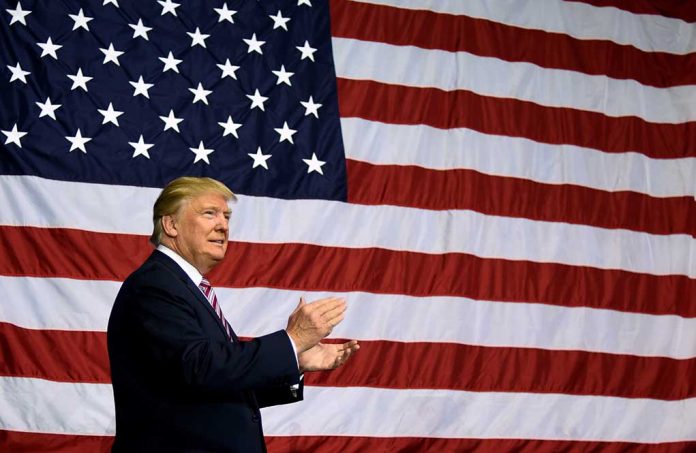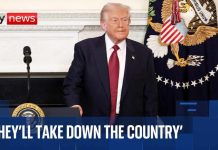
President Donald Trump has ignited constitutional debate by suggesting he might seek a third term, despite the 22nd Amendment’s clear prohibition against presidents serving more than two terms.
Key Takeaways
- Trump has publicly stated he’s “not joking” about pursuing a third presidential term, despite constitutional barriers.
- The 22nd Amendment explicitly limits presidents to two terms, ratified after FDR served four consecutive terms.
- Some Trump allies have proposed constitutional amendments or alternative paths to power, though legal experts dismiss these possibilities.
- Any change to term limits would require a constitutional amendment needing two-thirds approval from Congress and three-quarters of the states.
- Trump’s statements may be strategic political positioning rather than a realistic pursuit of an unconstitutional third term.
Trump’s Third-Term Comments Spark Constitutional Debate
During a recent “Meet the Press” interview, President Donald Trump made headlines by suggesting he might find ways to serve beyond the constitutionally mandated two-term limit. “I’m not joking. I’m not joking,” Trump insisted when asked about the possibility of a third term. He claimed strong public support for the idea, suggesting “there are methods which you could do it” despite clear constitutional restrictions. These comments have reignited discussions about presidential term limits and the boundaries of executive power in American democracy.
Trump’s statements included a novel interpretation of the 22nd Amendment, suggesting it might only bar consecutive third terms rather than lifetime limits. However, constitutional scholars unanimously reject this reading. The amendment states unambiguously that “no person shall be elected to the office of President more than twice.” This constitutional barrier was established in 1951 following Franklin D. Roosevelt’s unprecedented four consecutive terms, and was specifically designed to prevent any future president from extended rule, regardless of popularity or circumstances.
Proposed Pathways and Constitutional Realities
Some Trump allies have begun exploring hypothetical pathways to extend his leadership. Representative Andy Ogles introduced a resolution to amend the Constitution to allow non-consecutive third terms, though constitutional amendments require overwhelming support—a two-thirds majority in Congress and approval by three-quarters of states—making such changes extremely unlikely. Trump himself acknowledged another scenario during his “Meet the Press” interview involving running as vice president in 2028, then assuming the presidency if the elected president stepped down.
Even this workaround faces substantial constitutional hurdles. Legal experts point to the 12th Amendment, which states that no person constitutionally ineligible to be president can serve as vice president. Trump’s own attorney general, Pam Bondi, confirmed this reality when questioned during confirmation hearings, stating plainly that Trump cannot run for a third term “unless they change the Constitution.” These combined constitutional barriers make any path to a third term legally impossible without formal amendment processes.
Political Strategy or Constitutional Crisis?
Many political analysts view Trump’s third-term rhetoric as more political strategy than a genuine constitutional challenge. By projecting confidence about future terms, Trump may be working to avoid “lame duck” status during his second term while energizing his base with messages of strength and longevity. This approach aligns with Trump’s long-established pattern of testing political norms and boundaries while generating media attention and public debate around his statements.
Critics view these statements with alarm. Representative Daniel Goldman characterized Trump’s remarks as “another escalation in his clear effort to take over the government and dismantle our democracy.” This concern stems partly from Trump’s previous challenges to election results and comparisons some have drawn to international leaders like Vladimir Putin and Xi Jinping, who have effectively eliminated term limits in their countries. However, America’s constitutional systems contain multiple safeguards specifically designed to prevent the concentration of power, regardless of any individual’s popularity or political momentum.
Sources:
- Twenty-Second Amendment
- Twelfth Amendment
- Trump Claims There Are ‘Methods’ For Him To Serve Third Term—What To Know
- Trump says he’s considering ways to serve a third term as president
- Trump: ‘I’m Not Joking’ About Running for Third Presidential Term




